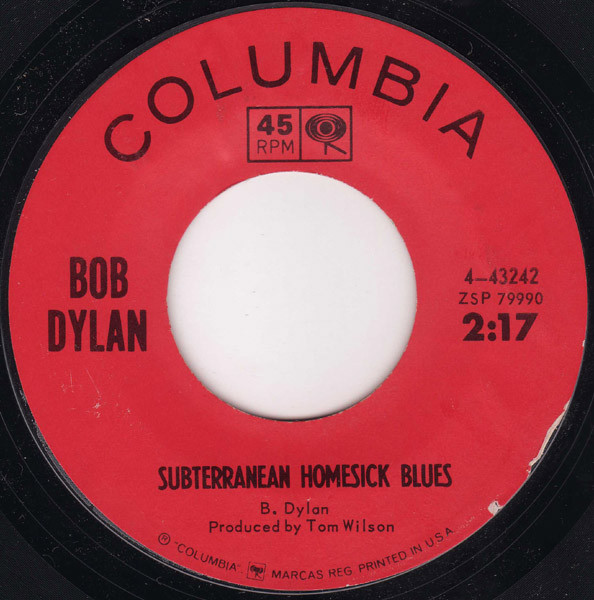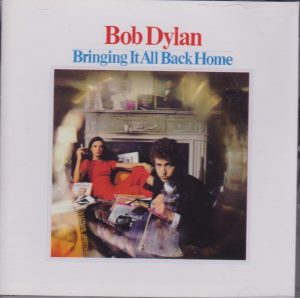
for the first time was my hearing Bob Dylan’s summer of 1965 talking blues single on the radio, which I promptly bought and spent hours trying to decipher the wild lyrics. As I deciphered the words, a story unfolded of an outsider, an adolescent coming of age in a crazy, mixed up, confusing world; in short, it reflected and spoke to my own personal experience and was a tremendous archetypal affirmation of the individual, the nonconformist, and the rebel.
Excerpt:
Johnny’s in the basement
Mixing up the medicine
I’m on the pavement
Thinking about the government
The man in the trench coat
Badge out, laid off
Says he’s got a bad cough
Wants to get it paid off
Look out kid
It’s somethin’ you did
God knows when
But you’re doing it again
You better duck down the alleyway
Lookin’ for a new friend
The man in the coonskin cap
In the big pen
Wants eleven dollar bills
But you only got ten
Shortly after that, on a snowy Saturday evening that December in a Winnipeg Ness Avenue drugstore, I took the plunge and bought his folk-rock album (well, the A side anyway; side B was folk–him solo), the first significant expression of that genre. I had never heard anything resembling that album before; this was something as powerful as The Beatles’ music, but something which had so much more to say with lyrics that challenged you, stretching your brain and imagination!
The lyrics consisted of metaphors, similes, juxtapositions, irony, and wit and offered memorable characterizations and imaginative image-laden narratives. Dylan’s lyrics were totally unique, allusive, literate, surreal, and archetypal; they were essentially and memorably the most significant popular poetry of the day.
“Subterranean Homesick Blues” was my first encounter with Dylan and later sent me back to his past folk albums and forward to the future albums Highway 61 Revisited and Blonde and Blonde, which completed his brilliant trifecta run. Dylan pretty much earned his Nobel Prize for Poetry from those three albums and established himself as the King of Folk, the King of Folk Rock, and the Ultimate Poet-Songwriter of the late 20th century.
I will conclude by adding that Dylan created much awareness and consciousness through his intelligent, no-nonsense lyrics. IMHO, it is impossible to truly understand the 1960s and ’60s sensibility without an exposure to Dylan’s amazing catalogue of over 300 songs consisting of many gems and masterpieces.

